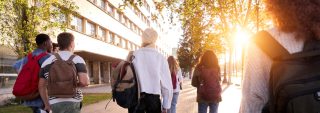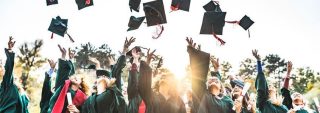- BLOG HOME
- »
- StudentTracker for High Schools
- »
- 10 Lessons from Past Educational Disruptions to Help Students Recover from Lost Learning

10 Lessons from Past Educational Disruptions to Help Students Recover from Lost Learning
In an LA School Report article, an analysis of past educational disruptions has revealed 10 important lessons that may be able to help improve student outcomes on the other side of the pandemic.
COVID-19 has had a significant impact on student success and continued education through ongoing disruption to educational pathways. From school closures to online learning, the pandemic has confronted students and educators with new challenges unlike any other typical school year.
According to the National Student Clearinghouse Research Center’s High School Benchmarks 2020 COVID-19 Special Analysis, there was a 6.8% decline of high school graduates attending college immediately after high school this past fall, an unprecedented one-year decline.
However, research on past educational disruptions reveals lessons that may be able to reduce the impact on educational success by COVID-19. Review the LA School Reports’ analysis and 10 lessons:
1. Reduced Learning Time Directly Equates to Reduced Student Success
There is a direct correlation between the total amount of educational time and overall student success. The less time that students spend learning, the less likely they are to graduate from high school or college.
2. Large Disruptions Produce Large Losses
Many academic researchers tend to reference specific disruption events such as natural catastrophes that can be traced back to determine student outcomes as a result. In these cases, researchers find long-term student effects such as lower graduation rates, reduced economic success, and increased reliance on government assistance. These losses are more severe when the disruption to education is greater.
3. The True Impact of COVID-19 Will Not Be Realized Immediately
Currently, the full extent of COVID-19 on student success is reliant on estimates and predictions based on the best data available. However, the real results and data will evolve over time as student outcomes actualize.
4. Younger Students Are More Susceptible to Learning Losses
In all research on past educational disruptions, younger students demonstrate the most severe repercussions of lost learning time. Younger students gain a lot more in each year of education than older students and they are less able to learn by themselves. Additionally, they find it more difficult to succeed in virtual learning environments.
5. Math Grades Are at The Highest Risk
Educational disruptions are most likely to significantly reduce math scores and student success in these areas. Student proficiency in English language arts is more closely related to a student’s home environment, but mathematics typically requires in-class instruction.
6. Older Students Are Less Likely to Continue Their Education
Although older students typically do not experience a loss of academic skills like younger students, they are less likely to re-engage with their education after a major disruption. Older students that have had their education interrupted are less likely to graduate from high school or college.
7. High-Income Students Have the Lowest Risk
Research on past educational disruptions has shown that higher-income students may experience little to no negative effects. These students are more likely to have access to equipment or alternative resources that can act as a replacement for traditional education.
8. Low-Income Students Have the Highest Risk
As most research and data indicates, low-income students have the highest risk of negative effects because of educational disruptions. It is most likely that students from lower income households or disadvantaged students will suffer the greatest losses because of COVID-19.
9. COVID-19 Economic Repercussions Will Continue to Affect Student Success
A recession caused by COVID-19 economic disruption is likely to also influence future educational budgets and overall student outcomes. Students from economically disadvantaged areas are less likely to graduate and are more likely to earn less money with their college degree if they do obtain one.
10. Student Outcomes Worsen Without Intervention
While the immediate focus may be on returning to a normalized school year, the evidence suggests that without additional intervention or a plan of recovery for students’ needs is required to improve academic and economic outcomes in the long-term.
To further help education institutions recover from the pandemic, review the Research Center’s COVID-19 special reports and other research.



